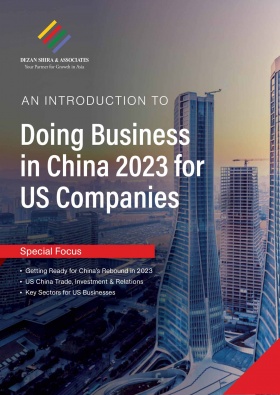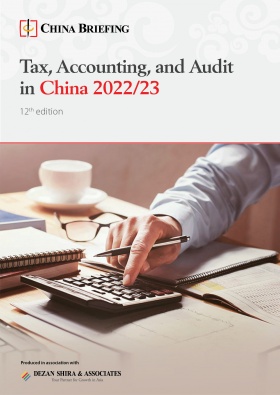Is China’s ‘Tech Crackdown’ Over? Our 2023 Regulatory Outlook for the Sector
Beijing has issued several new regulations in the last two years covering areas from antitrust to data protection, which collectively have been described as a “tech crackdown”. This is because the most visibly impacted by the new measure were tech companies. As 2023 gets underway, the government appears to have signaled a regulatory easing – placing the tech sector at the core of its economic growth strategy. Against this background, we analyze how the perceived tech crackdown transpired, upcoming changes to the regulatory environment for the tech sector in China, and its significance for foreign-invested businesses.
On February 13, 2023, China’s anti-monopoly regulator, the State Administration for Market Regulation (SAMR), conducted its annual conference on anti-monopoly work in coastal Qingdao, where it established its agenda for 2023. SAMR’s main focus in 2023 is to maintain the “bottom line of development security” and strengthen its “linkage effect” with international markets. This is just the latest of public-facing maneuvers that suggest a shift in the Chinese government’s approach to the technology industry.
Just one month before the SAMR conference, Guo Shuqing, who serves as the Chinese Communist Party secretary of the People’s Bank of China (PBOC), announced that China’s central bank would increase assistance to the private sector to strengthen the economy. Simultaneously, the bank will relax its scrutiny of tech companies.
In addition, China’s 2023 fiscal policy promises to support low- and middle-income groups, as well as individuals and businesses who have been affected the most by COVID-19. This approach also implies ensuring “fair treatment” to all types of businesses – including those in the tech sector.
In this article, we dive into the 2023 outlook of Beijing’s regulatory measures in the tech space while providing a complete recap of the tech crackdown and its significance to China businesses.
China’s tech crackdown as it happened
Starting in late 2020, the Chinese government intensified its regulation of the country’s fintech sector, impacting some leading internet-based conglomerates, and compelling them to refocus on local compliance after experiencing rapid expansion for several years.
Inevitably, China’s tech sector faced a series of challenges as previous regulatory scrutiny could be best described as relaxed in comparison. Several tech firms were able to record significant growth and spread into multiple traditional and new sectors. The tech crackdown ostensibly came in the wake of their unchecked growth and to address monopolistic behavior. Some decisive actions include the SAMR’s imposition of substantial fines on two of China’s corporate giants, Alibaba and Meituan, totaling US$2.8 billion and US$530 million, respectively.
The government also announced comprehensive new privacy laws, modified regulations for cross-border data transfer, introduced new measures in the gaming industry and prohibited certain kinds of content from being displayed on the internet.
How China’s tech regulations impacted the market
The quick succession of technology regulations and penalizing actions caused the Chinese market to experience varying levels of instability. Alibaba’s shares dropped by over two-thirds compared to 2020, while ride-hailing company Didi saw its online app suspended for suspected violation of the country’s cybersecurity law and lost over 80 percent of its initial public offering (IPO). Similarly, e-commerce giant JD.com was down by 25 percent in 2022 from the previous year.
As per a report by the China Academy of Information and Communications Technology (CAICT), investment and financing in China’s internet industry decreased significantly in the first quarter of 2022, dropping 42.6 percent compared to the previous quarter and by 76.7 percent compared to the same period in 2021. This decline led to layoffs in internet companies, with a total of 216,800 job losses reported from July to mid-March. On a contrasting note, the Cyberspace Administration of China (CAC) reported a net increase of 295,900 new hires during the same period. Still, the crackdown also severely impacted the profitability and valuation of firms over the past two years, resulting in a significant decline in new hiring.
Data from the job networking platform Maimai revealed a sharp drop (by 50 percent y-o-y) in the growth of new hiring among the top ride-hailing, e-commerce, gaming, and social media companies in December 2021. The next year also saw Chinese companies like Bilibili and ByteDance continue to reduce their workforce and slow new hiring.
First signs of relaxation
Concerned by an economy pressured by the COVID-19 resurgence and lockdowns, Beijing began to signal a reduction in some of the monitoring of the tech industry.
As early as January 19, 2022, the Chinese government, through a joint effort by nine ministries and commissions, released a document titled Opinions on Promoting Standardized, Healthy, and Sustainable Development of Platform Economy (Fa Gai Gao Ji [2021] No.1872). The document reaffirmed the government’s dedication to regulating platform companies’ prohibited activities, such as monopolies, unfair competition, and abuse of user data. The tone, however, had already changed. In addition to remarking on the obligations of domestic platform companies, the Opinions also explicitly endorsed their technological advancements and their international expansion.
Later in March, the Financial Stability and Development Committee of the State Council recommended the development of a healthy platform economy to enhance global competitiveness.
Finally, in May of the same year, during the Chinese People’s Political Consultative Conference (CPPCC), Vice Premier Liu explicitly reassured tech companies and expressed his backing for their overseas listings. Liu indicated that the government would support tech companies seeking to list their shares both domestically and internationally. Additionally, he emphasized the importance of promoting the growth and stability of the platform economy.
2023 should see a tech-boosted economic recovery
As 2023 began, there are multiple signs of a fresh start. For one, Didi has been allowed to open for new registrations. Also, China has rolled out 87 new gaming licenses as of February 2023. We foresee more such adjustments coming as the year goes by.
Chinese officials have given separate reassurances to platform companies that the regulatory crackdown is easing, as the digital economy is viewed to be a key driver of economic growth. Yet, it should be advised that the regulatory environment is not expected to return to the pre-crackdown status quo.
Moving forward, regulators have pledged to strengthen data security, promote financial stability, facilitate ‘common prosperity’, and prevent monopolies. At the same time, the degree of scrutiny may dial down.
The speed and extent of recovery in the platform sector in the coming months will be the ultimate test of how effective the new regulatory rectification is.
Growing government support
Investors are increasingly optimistic about the Chinese government’s support for the tech sector – reflected in the significant increase in the value of Chinese technology stocks in January 2023. A series of recent developments drive renewed confidence. Firstly, Beijing’s decision to allow the U.S. accounting watchdog (the US Public Company Accounting Oversight Board) to access Chinese companies resolved a long-standing audit dispute that could have led to the delisting of Chinese companies from U.S. exchanges. The move improved investor confidence in Chinese companies’ financial reporting, boosting prospects for foreign investment in these companies.
Secondly, the resumption of license approvals for imported games and the recent capital injection into a major fintech company have signaled a shift in the government’s approach to the tech sector. These developments together suggest that Beijing is no longer solely focused on regulating the industry, but is also prioritizing its growth and development.
Moreover, in a January interview with state media, a PBOC official reiterated the government’s intention to support the growth of platform companies, highlighting their potential to drive development, create jobs, and enhance global competitiveness. The official also provided insights on how businesses can access funding and Beijing’s perspective on IPOs, indicating that large and medium-sized enterprises can gradually get better access to credit and financing in the stock and bond markets.
Most importantly, the recent declarations by the SAMR boosted business confidence even further, as they presented a solid guarantee for the sector.
Overall, these developments provide strong evidence that the Chinese government is adopting a more supportive stance on the tech sector, and investors are taking note.
Was it ever a crackdown?
Although the regulatory measures have long been labeled a tech crackdown, China policy experts argue this term is fundamentally inaccurate.
The regulatory measures were not directed solely at the technology sector; industries, such as robotics and biotech were mostly unaffected. Moreover, big tech is highly instrumental to achieving the country’s development goals, and China does not intend to eliminate the platform economy. Instead, authorities believe that the industry’s sudden pre-eminence necessitates oversight to prevent excesses.
In this case, the term ‘rectification’ would be more appropriate than ‘crackdown’ because the regulatory changes are permanent and represent a new Chinese approach to governing big tech.
The regulatory measures carry several significant policy objectives. These include promoting macroeconomic stability in fintech, preventing market imbalances and anti-competitive behavior, addressing social issues, and limiting foreign influence on Chinese big tech firms. In addition, the rectification process includes interventions specific to Chinese online governance, such as content control, which regulators would have implemented regardless.
Accordingly, the underlying message of the regulatory campaign has been that the Chinese government wants companies to act as responsible corporate entities and contribute positively to the implementation of the country’s development plan.
Lessons for investors
The platform economy is a significant player in China’s involvement in global market competition and remains a sector of vital importance. The government will continue to rely on tech giants to play a more substantial role in sustaining the country’s growth trajectory.
At the time of writing, it is up for discussion whether platform companies will be willing to rapidly increase their workforce and invest in new skills in 2023. Another revealing factor will be the growth rate of the number of new businesses in the sector, after the sharp decline experienced in the past two years.
Beijing is hoping for this to happen. During the Central Economic Work Conference held in December 2022, policymakers promised to support the industry in order to allow it to expand, employ more people, and grow internationally despite the economic slowdown.
As Beijing continues to roll out and implement specific policies, we anticipate that the regulatory environment will be more supportive of the tech industry throughout 2023. However, this doesn’t mean the tech sector can go back to disordered growth. China is expected to seek ways to rein in firms while also growing its linkage with international markets. An easier way to read that would be to expect the supervision to be manageable and focused on compliance while minimizing disruption to the tech space.
Meanwhile, there are several valuable lessons that businesses and China investors can learn from the regulatory shift.
Among these is the importance of diversification. Investors have started to recognize the need to spread their investments across multiple areas, rather than putting all their eggs in one basket. For instance, they can expect strong and consistent support in the near future for key strategic areas, such as artificial intelligence and semiconductors, which have always been prioritized by the government.
China Briefing is written and produced by Dezan Shira & Associates. The practice assists foreign investors into China and has done so since 1992 through offices in Beijing, Tianjin, Dalian, Qingdao, Shanghai, Hangzhou, Ningbo, Suzhou, Guangzhou, Dongguan, Zhongshan, Shenzhen, and Hong Kong. Please contact the firm for assistance in China at china@dezshira.com.
Dezan Shira & Associates has offices in Vietnam, Indonesia, Singapore, United States, Germany, Italy, India, and Russia, in addition to our trade research facilities along the Belt & Road Initiative. We also have partner firms assisting foreign investors in The Philippines, Malaysia, Thailand, Bangladesh.
- Previous Article China Fully Implements New IPO Rules – Understanding the Registration-Based Mechanism for Public Listings (Updated)
- Next Article Hong Kong Budget 2023-24: Speedy Recovery and the Path to Normalcy













